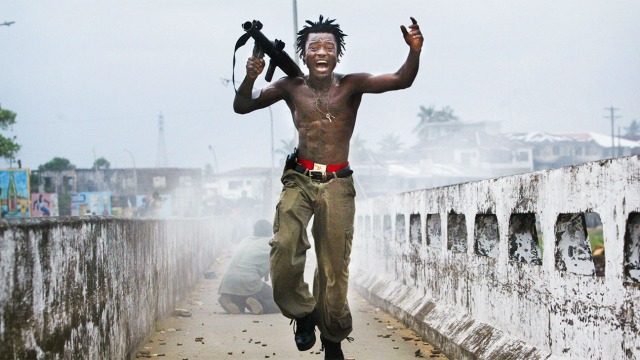
We still call them “combat photographers,” even though the more exact term these days is “conflict photographers.” The dangers they face are broader, the conflicts murkier than mere “wars.”
But to master the craft, the risks are the same. “You have to get close,” one and all will tell you. Get right in the thick of things. The opening images of “Hondros,” about acclaimed Getty Images photographer Chris Hondros, make that clear.
Shaky video captures a firefight. And in the middle of it, Hondros takes a call.
“Fine. Things are fine,” he tells the caller as AK-47s go off all around him. “Let me call you back in about a half hour or so.”
For decades, Hondros could be found in every hot spot the world produced, Kosovo to Liberia, Afghanistan to Iraq.
He was not in it for the rush, he declares. “I’m not into adventure sports” or any of the other telltale cliches attached to people in this field. He was all about the journalism, “shining a light” on international tragedies, hoping to awaken the world to human-made disasters, and in so doing perhaps getting the world to put a stop to them.
As his longtime friend and sometime colleague Greg Campbell’s film makes clear, Hondros was moved by what he saw and photographed on the battlefields of the world, men and child soldier weeping over crimson covered bodies of the fallen, a little girl wailing at her parents, accidentally shot as they drove their car through a U.S. checkpoint in Iraq.
What separated Hondros from his colleagues, legions of whom appear in testament to his life and work in “Hondros,” was the extra steps he took.
A Liberian rebel teen has just fired his rocket propelled grenade at the dictator Samuel Taylor’s army, a shot that would make Hondros famous.

Hondros goes back to Liberia after the conflict, friends help him find that young man, and he pays for the kid’s college.
An Iraqi family is all but wiped out in another famous shot. Hondros helps get a wounded little boy to America for live-saving surgery.
His editors, rivals and colleagues marvel at how anyone was able to get there just ahead of the news, arriving in Egypt to cover the nascent “Arab Spring,” tumbling ahead of the U.S. forces in the invasion of Iraq, “deeply empathizing” with those he photographed at every step of the way.
“Hondros” has to go to some pains to separate itself from other films on this sort of subject, their story “arc” and their many over-familiar tropes. Swashbuckling shooters dashing from war zone to war zone, partying behind the lines, risking their necks under fire when they go into battle.
If you’ve read or seen any film about combat photographers, fiction (“Salvador,””Under Fire”) or documentary (“Which is the Front from Here: The Life and Time of Tim Hetherington”) you know how such films and such careers inevitably turn out. Hondros found his calling, found fame, found love and then was killed.
“Hondros” gets meaning out of that death by devoting itself, at length, to the dangers journalists now face in combat zones. In an era of controlling your own message and easy access to getting that message on the World Wide Web, foreigners filming, interviewing and taking pictures of your struggle can be seen as unnecessary or worse, a threat. Journalists are being targeted in combat zones around the world.
“Hondros” highlights that danger and brings out the humanity in a career that was above and beyond the stereotypes of their profession. (These guys are overwhelmingly hunky white males of the Sebastian Junger set, adrenaline junkies even if they deny it.)
And if this documentary, co-produced by Jake Gyllenhaal, leads to a feature on the most empathetic shooter of all, don’t be surprised. This was a life and career worth celebrating.

MPAA Rating: unrated, with images of graphic violence.
Cast: Christopher Hondros, Inge Hondros, Greg Campbell, many others
Credits: Directed by Greg Campbell, written by Jenny Golden and Greg Campbell. An Entertainment Studios release.
Running time: 1:32
